- Home
- John Scalzi
The Consuming Fire (The Interdependency)
The Consuming Fire (The Interdependency) Read online
Begin Reading
Table of Contents
About the Author
Copyright Page
Thank you for buying this
Tom Doherty Associates ebook.
To receive special offers, bonus content,
and info on new releases and other great reads,
sign up for our newsletters.
Or visit us online at
us.macmillan.com/newslettersignup
For email updates on the author, click here.
The author and publisher have provided this e-book to you without Digital Rights Management software (DRM) applied so that you can enjoy reading it on your personal devices. This e-book is for your personal use only. You may not print or post this e-book, or make this e-book publicly available in any way. You may not copy, reproduce, or upload this e-book, other than to read it on one of your personal devices.
Copyright infringement is against the law. If you believe the copy of this e-book you are reading infringes on the author’s copyright, please notify the publisher at: us.macmillanusa.com/piracy.
To Meg Frank and Jesi Lipp
PROLOGUE
Years later Lenson Ornill would reflect on the irony that his time as a religious man would be bracketed by a single and particular word.
“Well, fuck,” Gonre Ornill said, to her husband, Tans, on the bridge of their spaceship, the We Never Agreed to This.
Tans looked up from his own workstation, where he had been instructing their son, Lenson, age eleven, on some of the finer points of shipwide energy management. “What is it?” he said.
“You know that imperial ship that wasn’t following us?”
“Yeah.”
“It’s following us now.”
Lenson watched his father frown, wipe the energy management screen from his own workstation and call up the navigation screen. On the screen was a representation of all the ship traffic between the outpost of Kumasi and the Flow shoal that would take the Agreed to Yogyakarta, their next destination, after five weeks of travel. Most of the ships were commercial and trade concerns, like the Agreed. Two of them were Imperial Navy ships. One of those, the Oliveer Bransid, had just plotted a course that would intercept the Agreed in roughly six hours, right before it hit the shoal.
“I thought we were paid up,” Tans said to his wife.
“We are paid up,” Gonre said.
Tans motioned to his workscreen, as if to say, Well, obviously not.
Gonre shook her head. “We’re paid up,” she repeated.
“There’s a new naval commander,” Genaro Partridge, comms officer, said. She was part of the bridge crew of the Agreed. “I heard Samhir talking about it in mess. He says he was warned about him when we were loading in the cargo.”
“You’re telling us about this now?” Tans said to Partridge.
“Sorry. We were talking at mess. I thought Samhir told you.”
“I meant to tell you,” Samhir Ghan, the ship’s purser, said three minutes later, when he appeared on the bridge, in a hurry. Lenson, looking at Ghan’s slightly breathless form, knew his father had a reputation for being a genial captain, until he wasn’t. Ghan was in danger of making his father not genial. “Sorry. We got busy in cargo.”
“Tell me now,” Tans said.
“The new naval commander is named Witt. A real grasping prick by all indications. Was transferred out of a job at Hub because he slept with the wrong person’s spouse and is trying to get back there by ‘cleaning house’ here. Which means he’s messing with established practices to look like he’s being effective.”
Tans frowned at this. Lenson, at eleven, didn’t know the particulars of his parents’ business, but he knew enough to know that much of it was predicated on “good relations” with the various local and imperial law enforcement people of the systems the Agreed traveled to. This entailed “established practices,” which Lenson had only recently discovered meant giving certain people money and other desirable things in ways that were understood to be not entirely legal.
Lenson was neutral on all of this—he was young enough to believe that everything his parents did was by definition correct, and also to be bored with the fiddly details of their line of work—but it did seem like a long way to go around things.
“Who told you this?” Gonre asked Ghan.
“Cybel Takkat,” Ghan said. “My opposite on the Phenom.” Lenson knew Ghan was referring to the ship That’s a Phenomenal View, with whom they had shared a cargo hold at the Kumasi mercantile station. Smaller ships like the Agreed and the Phenom would frequently co-rent cargo space on the station to save money. Occasionally during the load in and load out things would get rushed and certain bits of inventory that started off on one ship would accidentally end up on another. Now that Lenson thought of it, he suspected this required some “established practices” as well. “She mentioned that one of her payments got waved off by one of her usuals in the navy here. He said he was being watched too closely by Witt’s people now.”
“We could have used this information sooner,” Gonre said.
“Sorry,” Ghan repeated. “I meant to tell you. I thought Cybel was just talking about how graft was being cracked down on, and we’d have to be less obvious about it from here on out. I didn’t think she was saying that the navy was going to be chasing us to the Flow shoal.”
Tans looked over to Partridge. “Any word from that naval ship?”
“They’re not hailing us, no,” Partridge said. “They’re just moving to intercept.”
“We’re not at full power,” Gonre said to her husband. “We could run for it.”
Tans shook his head. “Not yet.” He tapped his workscreen to signify the Bransid. “That’s a big ship. Lots of mass. It’s slower to accelerate but faster under speed than we are. If we break and run now they’ll catch up to us before we make it to the shoal.”
“If they catch us with this particular cargo, we’re all fucked,” Ghan said, then remembered to whom he was asserting this fact. “Uh, sir.”
Tans nodded absentmindedly at this and danced his fingers across his workstation keyboard. Lenson looked and saw his father was making calculations for the Agreed and for the Bransid. He couldn’t follow the details but Tans made a small grunt of satisfaction, and then looked up at him. “Do you know what I’m doing?” he asked Lenson.
“No,” Lenson said.
“Guess.”
“Trying to get away from the other ship.”
“Right,” Tans said. “But do you know how? I already said if we accelerated now, they’d catch us.”
“I don’t know,” Lenson said.
“Come on, work with me, Len.”
Lenson thought about it. “You’re waiting,” he finally said, and hoped that his father wouldn’t ask for any more detail than that, because frankly Lenson had no idea what would come after that.
“Yes!” Tans said. “There’s a point in time after which if we accelerate under full engines, the navy ship won’t catch us before we make the Flow shoal, even under their full power. And that time is”—he looked over to Gonre—“four hours, sixteen minutes from now.”
“As long as the Bransid doesn’t start accelerating before then,” Gonre said.
“Yes.”
“And as long as our own engines are able to handle the load of full acceleration for the three hours it will take us to hit the shoal.”
“Yes.”
“And as long as our push fields stay active so we’re not compressed into jelly by the constant high-g acceleration.”
“Yes,” Tans said, testily.
“And as long as they don’t try to shove a missile into our t
ailpipe.”
“For fuck’s sake, Gonre,” Tans said.
“Let’s not be too impressed with ourselves yet, is what I’m saying,” Gonre concluded. She turned to her son. “And you, go back to your cabin. The rest of us are going to be busy until we hit the shoal.”
“There’s nothing to do in my cabin,” Lenson complained.
“Sure there is. It’s called studying.”
Lenson groaned at this and trudged back to his cabin, which, despite being roughly the size of a broom closet, was the second-most luxurious accommodation on the ship, after his parents’ cabin, which was the size of two broom closets. In his cabin, Lenson activated his tablet and, rather than study, watched cartoons for a couple of hours until suddenly the cartoons wiped themselves out and educational materials appeared on his screen. Lenson groaned again, annoyed that his mother, who was supposed to be busy, had time to check on what he was looking at. Reluctantly he started reading his religion lesson, on Rachela, the Prophet, first leader and the first emperox of the Interdependency.
Lenson was not a very great student in a general sense but found the religion lessons of his study particularly boring. Neither he nor his parents were in any way religious, or followed the tenets of the Church of the Interdependency any more than they followed any other church. They weren’t opposed to the church, or any other religion—Lenson knew some of the crew members of the Agreed followed their own personal faiths and his parents didn’t care about it one way or the other—but the Ornills themselves left it alone and had passed their rather neutral apathy on the matter to their son.
The most you could say about the Ornill family’s lack of religion was that when it came to which religion they weren’t participating in, they weren’t participating in the Church of the Interdependency most of all. For his part, Lenson knew other religions existed but knew so little about them that it couldn’t be said he rejected or ignored them. They weren’t even on the table.
The Church of the Interdependency, on the other hand, he knew at least a little about. One of the advantages of being the official religion of the Interdependency was that information about it was required reading in the study materials every child in the empire was obliged to have as part of their education. You learned about the C of I, and of the Prophet-Emperox Rachela, whether you believed or not, and whether you cared or not.
Well, that and the Ornills celebrated Emperox’s Day, pinned to Rachela’s standard calendar birthday, like everyone did, as an excuse for sleeping in, trading gifts and eating like a pig.
Lenson’s studies at the moment were not talking about Emperox’s Day, or gifts, or stuffing one’s self, unfortunately for him. They were discussing Rachela’s prophecies, the set of future-seeing pronouncements that galvanized the disparate systems that housed human settlements into the single empire known as the Interdependency and which helped to establish the economic, legal and social systems that the Interdependency still worked from, more than a millennium later.
All of which, Lenson decided, were boring as heck. Not only because the study materials, crafted for readers between the standard ages of ten and twelve, did not go into the prophecies or their impact in any substantive manner, preferring simple declarative sentences that took the material as a pedagogical fact rather than a matter of interpretation and debate (which to be fair, Lenson, again, not a very great student, would not have been an engaged participant in). It was also because of an inchoate feeling that Lenson had while reading about the prophecies, something that he couldn’t have put into words even if he had tried.
But had he tried, what they would have boiled down to would have been, Hey, you know what, basing an entire system of social, political and economic control on the vague, all-too-easily misinterpreted words of a single person claiming divine inspiration is probably not actually all that smart, now, is it.
This was because Lenson, like his parents before him, was a mostly practical sort, not personally given over to matters spiritual, teleological or eschatological, and indeed all of the above offered up a muted sense of disquiet, the intellectual version of biting into a piece of pie and having a taste there you can’t quite pin down but you know is not meant for that particular pie, and throws the whole thing off from being delicious to being a thing in your mouth that you’re not entirely sure you want to be there but it would be rude to spit it out so you just swallow it, cover the rest of the pie with a napkin, and just try to get on with your day.
Reading the prophecies gave Lenson this same maddeningly unpin-downable sense of intellectual dissatisfaction on top of his boredom, so he did the only logical thing he could about it: He fell asleep, tablet in hand. This was an excellent plan, until suddenly the Agreed rocked violently, spilling Lenson from his bunk, and a roaring wind tore through his cabin, sucking the air from it for several seconds until the cabin door slammed shut.
Lenson lay on the floor, confused, gasping for breath, wondering what happened, and listening to several high-pitched whistling sounds in his cabin. His door had slammed shut but the seal was not perfect; likewise while the air vents in his room had sealed when air begun rushing through them in the wrong direction, there were tiny places where air snuck around the seal.
As a child who had lived on a spacecraft all his life, Lenson did not need to be told what those whistling sounds meant. He went to his door and pushed it completely shut, sealing it. That meant the only place his cabin was bleeding air was through the vents. The vent seals, unfortunately, were out of his reach, inside the walls of the ship.
His tablet pinged and Lenson answered it to find his mother on the other end. After the several seconds of weeping relief she had that her son was alive, she filled him in on what had happened.
“Motherfuckers shot at us,” she said, and it was the first time Lenson had ever heard his mother use that particular profanity. “They couldn’t catch up to us and we weren’t responding to their hails, so just before we entered the Flow they launched three missiles at us. Our defenses stopped them, but one detonated too close, and parts of the missile ruptured the hull near you. We’ve sealed off those areas, but we have a problem.”
“What is it?” Lenson asked.
“We’re in the Flow now,” Gonre said. “That means we have to be careful not to disturb the bubble of space-time around the ship. If we disturb it too much, and we rupture it, that could mean trouble for the whole ship.”
Lenson knew his mother was underselling the danger. The Flow was like a river that spaceships traveled between star systems, that could take the ships back and forth faster than if they traveled in normal space, where they could only go as fast as the speed of light. But while the Flow was like a river, it wasn’t a river—it was an extradimensional whatever-it-was that if you were ever exposed to it directly, you would just disappear. Ships traveling in the Flow had to make an energy bubble that trapped a bit of space-time with them so they could still exist inside the Flow, and if the bubble popped, so did everything inside it.
“So we just have to be careful on our way to you, and in fixing the ship,” Gonre said.
“Mom, I’m losing air,” Lenson said.
Lenson watched his mother do a very good job of not losing it. “How much?” she asked.
“Only a little now. I lost a lot at first, but then the door closed and I sealed it. But there’s still air going out of the vent.”
Gonre turned away her tablet for a moment to yell at someone on the bridge. Then she turned back to her son. “We’re going to get that fixed first,” she said, “and get some more air to you.”
“How long will that take?” Lenson asked.
“Not long,” Gonre promised. “Can you be brave until then?”
“Sure,” Lenson said.
But after two hours and the air growing noticeably thinner, Lenson stopped being brave and began to cry a little. After three hours he had a full-blown panic attack and it took everything Tans Ornill could do over the tablet connection to keep his son
from hyperventilating away the dwindling supplies of his oxygen.
After four hours, and for the first time in his life, Lenson prayed to the Prophet Rachela.
After five hours, she came to visit.
Lenson looked up at the smiling visage of the Prophet, who had a serene, calm smile that didn’t quite reach her eyes, keeping in the best traditions of religious iconography through the ages, in which the gods, goddesses and prophets could manage, at best, a disinterested upturning of the lips. Nevertheless Lenson was quieted and warmed by it.
“I’m scared,” Lenson admitted to the Prophet. She just smiled more at him, radiating comfort that was more reassuring than any words from her could be. It said to him, or so he believed (and in this particular moment, why should he doubt it?) that she came because he prayed to her, that she came just for him, and that her presence here was proof that he, Lenson Ornill, would survive, and not just survive, but was destined for great things.
It was there, lying quiet in his cabin, gazing up at the Prophet and blinking so very slowly, that Lenson Ornill dedicated his life to the Church of the Interdependency.
The Prophet smiled down at him some more, as if accepting his gift of himself to her church.
Just then the vents clattered as they opened up, flooding the cabin with air. Lenson Ornill, gulping sweet oxygen and in the throes of religious ecstasy, passed out.
“That sounds like textbook hypoxia to me,” Tans Ornill told his son in the ship’s small infirmary, later that evening. Tans had been the first to enter Lenson’s cabin, his immediate terror assuaged when he heard his son snoring. When Lenson woke up in the infirmary, he had immediately told his parents of his miraculous visitor. “You were short of oxygen and you’d been reading about the Prophet just before the attack. So it makes sense you might hallucinate her.”
Lenson looked up at his father and his mother, both hovering over his infirmary cot, both so immensely relieved that their son was alive, and realized that they would never appreciate nor understand the experience of his visitation, and (rather maturely, he thought, at the time) decided to let them off the hook, nodded in apparent agreement with his father, and then let them both change the subject to that bastard Witt, upon whom they vowed certain revenge, and who would, Lenson learned much later, somehow find himself on the wrong side of an airlock roughly a year after the Agreed was attacked. The rumor was that Witt had once again slept with the wrong someone else’s spouse, but Lenson thought other factors might have been in play, which his parents may or may not have been involved with.

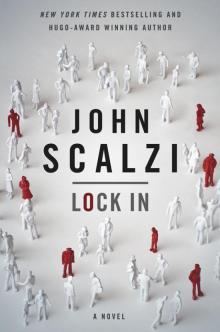 Lock In
Lock In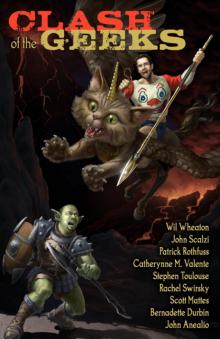 Clash of the Geeks
Clash of the Geeks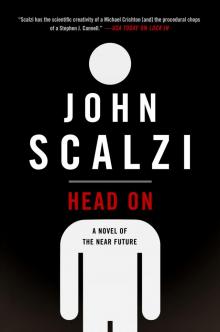 Head On
Head On The Dog King
The Dog King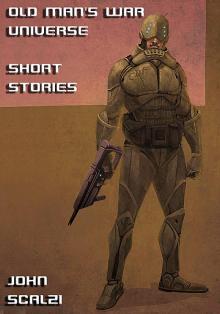 Old Man's War Universe: Short Stories
Old Man's War Universe: Short Stories The End of All Things
The End of All Things Tales From the Clarke
Tales From the Clarke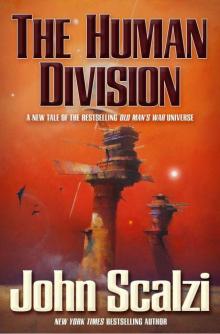 The Human Division
The Human Division The Android's Dream
The Android's Dream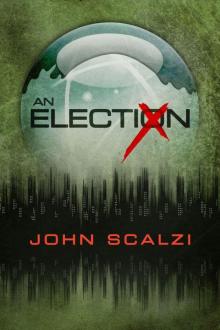 An Election
An Election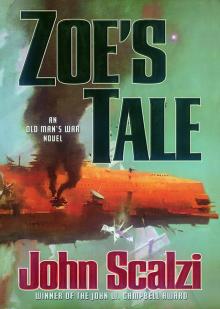 Zoe's Tale
Zoe's Tale Agent to the Stars
Agent to the Stars This Hollow Union
This Hollow Union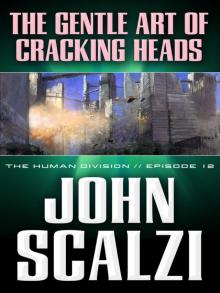 The Gentle Art of Cracking Heads
The Gentle Art of Cracking Heads Old Man's War
Old Man's War The Tale of the Wicked
The Tale of the Wicked Your Hate Mail Will Be Graded: A Decade of Whatever, 1998-2008
Your Hate Mail Will Be Graded: A Decade of Whatever, 1998-2008 Judge Sn Goes Golfing
Judge Sn Goes Golfing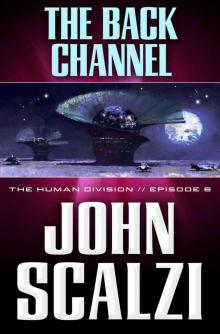 The Back Channel
The Back Channel The Human Division 0.5 - After the Coup
The Human Division 0.5 - After the Coup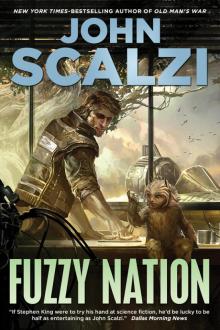 Fuzzy Nation
Fuzzy Nation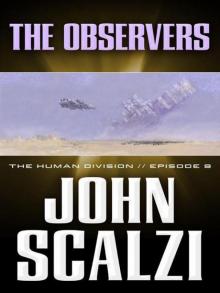 The Observers
The Observers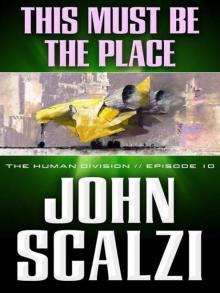 This Must Be the Place
This Must Be the Place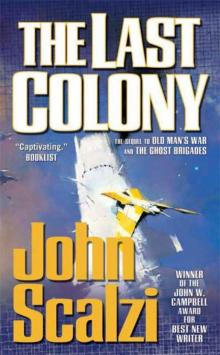 The Last Colony
The Last Colony Unlocked: An Oral History of Haden's Syndrome
Unlocked: An Oral History of Haden's Syndrome A Voice in the Wilderness
A Voice in the Wilderness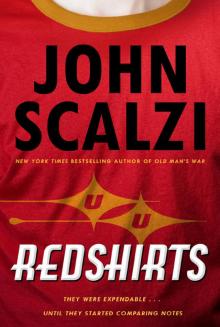 Redshirts
Redshirts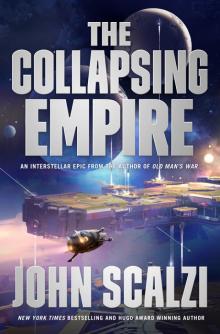 The Collapsing Empire
The Collapsing Empire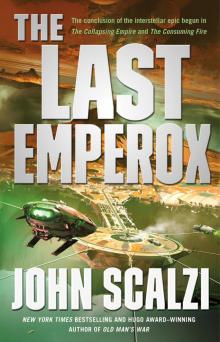 The Last Emperox
The Last Emperox The God Engines
The God Engines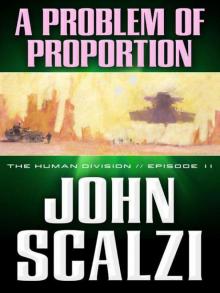 A Problem of Proportion
A Problem of Proportion THAT WAS THE MILLENIUM THAT WAS
THAT WAS THE MILLENIUM THAT WAS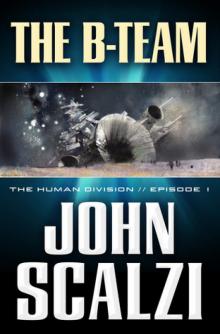 The B-Team
The B-Team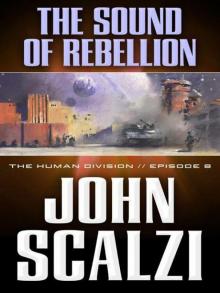 The Sound of Rebellion
The Sound of Rebellion The President's Brain Is Missing
The President's Brain Is Missing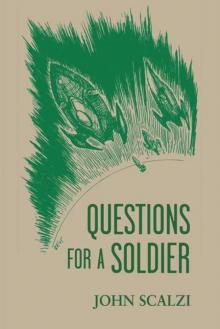 Questions for a Soldier
Questions for a Soldier Walk the Plank
Walk the Plank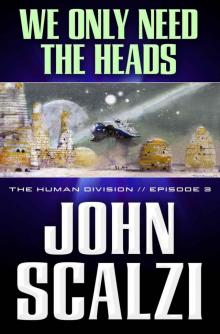 We Only Need the Heads
We Only Need the Heads How I Proposed to My Wife: An Alien Sex Story
How I Proposed to My Wife: An Alien Sex Story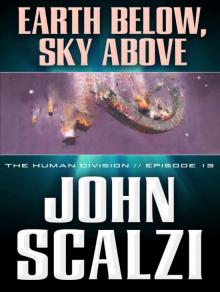 Earth Below, Sky Above
Earth Below, Sky Above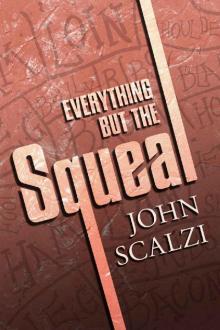 Everything but the Squeal
Everything but the Squeal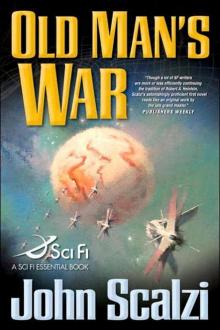 Old Man’s War
Old Man’s War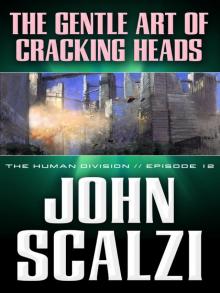 The Human Division #12: The Gentle Art of Cracking Heads
The Human Division #12: The Gentle Art of Cracking Heads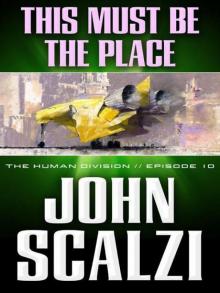 This Must Be the Place thd-10
This Must Be the Place thd-10 A Voice in the Wilderness thd-4
A Voice in the Wilderness thd-4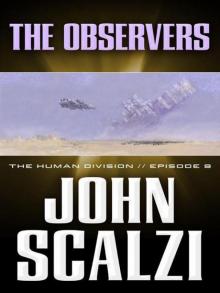 The Observers thd-9
The Observers thd-9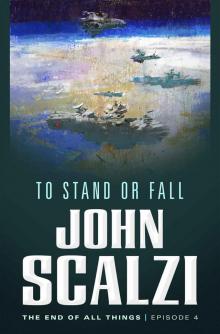 The End of All Things: The Fourth Instalment
The End of All Things: The Fourth Instalment Earth Below, Sky Above thd-13
Earth Below, Sky Above thd-13 Zoe`s Tale вбиос-4
Zoe`s Tale вбиос-4 After the Coup
After the Coup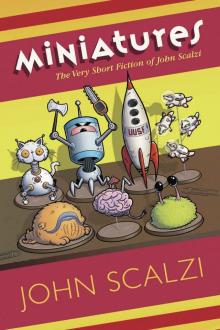 Miniatures: The Very Short Fiction of John Scalzi
Miniatures: The Very Short Fiction of John Scalzi The Last Colony вбиос-3
The Last Colony вбиос-3 Tales From the Clarke thd-5
Tales From the Clarke thd-5 Old Man's War omw-1
Old Man's War omw-1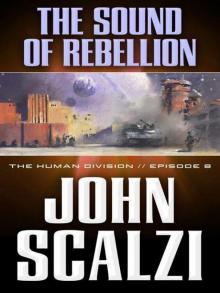 The Human Division #8: The Sound of Rebellion
The Human Division #8: The Sound of Rebellion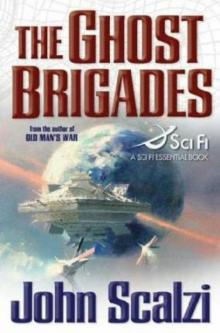 The Ghost Brigades omw-2
The Ghost Brigades omw-2 The Sagan Diary (old man's war)
The Sagan Diary (old man's war)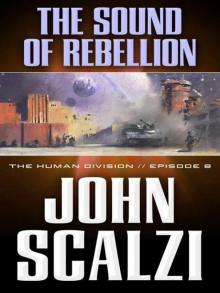 The Sound of Rebellion thd-8
The Sound of Rebellion thd-8 The Human Division 13 - Earth Below, Sky Above
The Human Division 13 - Earth Below, Sky Above Head On_A Novel of the Near Future
Head On_A Novel of the Near Future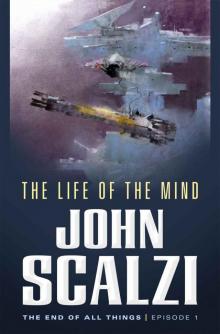 The End of All Things: The First Instalment
The End of All Things: The First Instalment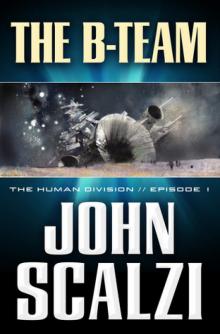 The B-Team thd-1
The B-Team thd-1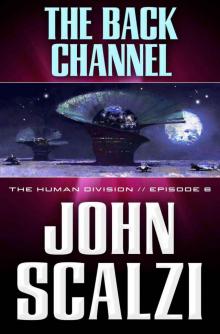 The Back Channel thd-6
The Back Channel thd-6 Walk the Plank thd-2
Walk the Plank thd-2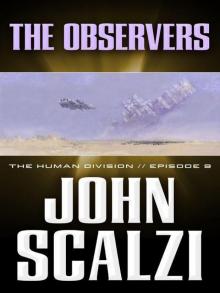 The Human Division #9: The Observers
The Human Division #9: The Observers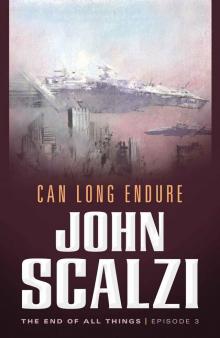 The End of All Things: The Third Instalment
The End of All Things: The Third Instalment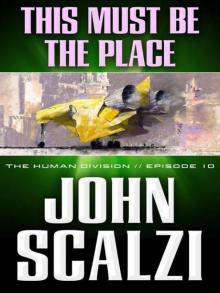 The Human Division #10: This Must Be the Place
The Human Division #10: This Must Be the Place The End of All Things #2: This Hollow Union
The End of All Things #2: This Hollow Union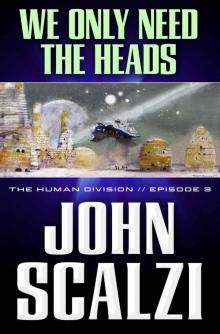 We Only Need the Heads thd-3
We Only Need the Heads thd-3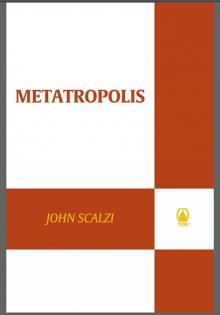 Metatropolis
Metatropolis The Dog King thd-7
The Dog King thd-7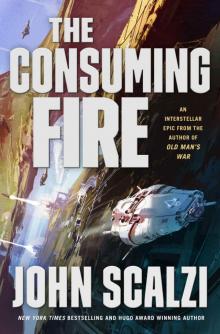 The Consuming Fire (The Interdependency)
The Consuming Fire (The Interdependency)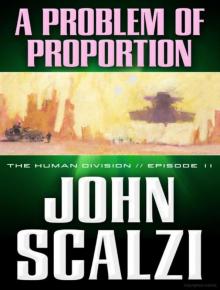 The Human Division #11: A Problem of Proportion
The Human Division #11: A Problem of Proportion